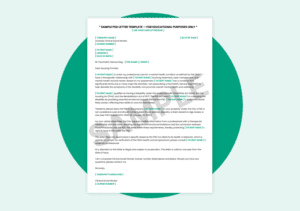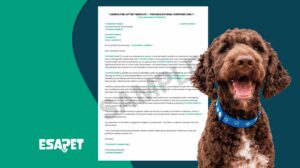Who can write an emotional support animal letter (ESA letter) legally? (2026 Update)

An Emotional Support Animal (ESA) letter is a legal document that confirms your need for an emotional support animal due to a qualifying mental or emotional health condition. However, not just anyone can issue one.
Only a mental health professional licensed in your state is qualified to write ESA letters, because they are trained to assess, diagnose, and treat mental health disorders. A legitimate ESA letter must be a letter from a licensed mental health professional and is often considered a formal prescription for an emotional support animal.
The first step to obtaining a legitimate ESA letter is to establish a relationship with a mental health professional licensed in your state. There are common misconceptions about who can provide ESA letters, so let’s clarify who qualifies, and who doesn’t.
In this guide, you’ll learn:
- Which professionals can write ESA letters (and why)
- What licenses and credentials are accepted
- Who cannot legally issue ESA documentation, despite common misconceptions
Let’s break down the roles of each professional and what makes a letter valid or not.
Who Can Legally Write an ESA Letter?
Only state-licensed health professionals are authorized to issue valid Emotional Support Animal (ESA) letters under U.S. federal law—including the Fair Housing Act (FHA) and, in limited historical contexts, the Air Carrier Access Act (ACAA).
The following 9 licensed health professionals qualify to issue ESA letters:
- Therapists
- Primary Care Providers (PCPs) and Family Doctors
- Psychiatrists (MD, DO)
- Clinical Social Workers (LCSWs)
- Professional Counselors (LPCs)
- Psychologists (PhD, PsyD)
- PMHNPs (Psychiatric Nurse Practitioners)
- Physician Assistants
- Pediatricians
Get your Official ESA Letter Consultation from a licensed therapist.
Get ESA Letter NowCan My Therapist write an ESA letter?
Yes, licensed therapists can legally write ESA letters as long as they are licensed in the state where the patient resides and have either an established therapeutic relationship or have conducted a proper mental health evaluation.
Why Are Licensed Therapists Qualified?
Licensed therapists are mental health professionals trained to diagnose and treat psychological and emotional disorders. Their scope of practice includes assessing mental health conditions and determining if an emotional support animal is clinically appropriate for the patient’s treatment.
Their authority is supported by:
- The Fair Housing Act (FHA)
- The HUD 2020 Guidance, which recognizes licensed therapists as valid providers of ESA documentation
Legal and Ethical Requirements
To issue a valid ESA letter, licensed therapists must:
- Be licensed in the state where the patient resides
- Base the letter on a legitimate diagnosis or clinical evaluation
- Follow state regulations and professional ethical codes (such as those established by the American Counseling Association or equivalent bodies)
- Include their license number, contact information, and professional credentials in the letter
Can Unlicensed Therapists Issue ESA Letters?
No. Therapists without a valid state license (such as life coaches or unlicensed counselors) generally do not have legal authority to diagnose or issue ESA letters. Some states have strict regulations that prohibit unlicensed individuals from providing any disability-related documentation.
| Role | Can Write? | Requirements |
|---|---|---|
| Licensed Therapist | ✅ Yes | Must be licensed, evaluate condition, and follow legal standards |
| Unlicensed Therapist/Coach | 🔴 No | No legal diagnostic or clinical authority |
Can Doctors, Primary Care Providers (PCPs) and General Practitioners Write ESA Letters?
Yes, licensed PCPs and family doctors can write ESA letters if they are treating the patient for a mental health condition and base the letter on a documented evaluation. However, these professionals are not preferred unless they have relevant training or a history of treating the patient’s mental health.
Why the Role Is Controversial?
Primary care providers are licensed physicians and recognized under the Fair Housing Act, but they are not mental health specialists. If they do not have a clear history of treating the patient’s emotional or psychological condition, ESA letters issued by them may be challenged by housing providers.
When Are PCPs Considered Acceptable?
- When they have an established patient relationship
- When they’ve diagnosed and treated the patient for a mental/emotional condition
- When the letter includes sufficient clinical justification and documentation
🟢 What the letter should include:
- Patient name.
- Whether the clinician has a professional relationship with the patient.
- Type of animal (dog/cat/etc.).
- A statement that the person has a disability (no diagnosis required) and the disability-related need for the animal (how it alleviates symptoms/limitations).
- Clinician signature, contact, and license information.
🔴 What the letter should NOT include:
- Specific diagnosis of the patient’s condition.
- Detailed medical history.
- Excessive personal or unrelated information.
Get your Official ESA Letter Consultation from a licensed therapist.
Get ESA Letter NowLegal and Ethical Requirements
To issue an ESA letter, PCPs must:
- Be actively licensed in the state where the patient resides
- Document a mental health evaluation or diagnosis
- Include full credentials, license number, and signature
| Role | Can Write? | Requirements |
|---|---|---|
| PCP / Family Doctor | 🟡 Conditional | Needs clear records + mental health notes |
| PCP with no mental health history | 🔴 Risky | Fails compliance without evaluation |
Can Psychiatrists (MD, DO) Write an ESA Letter?
Yes. Licensed psychiatrists can legally write ESA letters as long as they are licensed in the state where the patient resides and have either conducted a psychiatric evaluation or maintain an ongoing therapeutic relationship with the patient.
Why Are Psychiatrists Qualified?
Psychiatrists are medical doctors (MD or DO) specializing in mental health. They are trained to diagnose, treat, and manage psychological disorders, including prescribing medication when appropriate. Their clinical authority is recognized in both medical and legal settings.
Their qualifications are supported by:
- The Fair Housing Act (FHA)
- HUD’s 2020 Guidance, which lists psychiatrists among the professionals permitted to recommend ESAs
As licensed physicians with a focus on mental health, psychiatrists are among the most authoritative professionals to issue ESA letters.
Legal and Ethical Requirements
To issue a valid ESA letter, psychiatrists must:
- Hold an active medical license in the state where the patient resides
- Base the recommendation on a documented psychiatric diagnosis or evaluation
- Comply with the legal and ethical standards established by state medical boards and professional associations like the APA (American Psychiatric Association)
- Include license number, contact information, credentials, and signature in the letter
Can Medical Residents or Unlicensed Psychiatry Trainees Issue ESA Letters?
No. Individuals still in training or without active licensure cannot independently diagnose patients or write ESA letters. Only licensed psychiatrists may issue ESA documentation.
| Role | Can Write? | Requirements |
|---|---|---|
| Licensed Psychiatrist (MD, DO) | 🟢 Yes | Must be licensed, conduct evaluation, and follow legal/ethical standards |
| Psychiatry Resident or Trainee | 🔴 No | No independent authority to diagnose or issue ESA |
Get your Official ESA Letter Consultation from a licensed therapist.
Get ESA Letter NowCan Licenced Clinical Social Workers (LCSW) write an ESA letter?
Yes, Licensed Clinical Social Workers (LCSWs) can legally write ESA letters — provided they are licensed in the state where the patient resides and have either an established therapeutic relationship or have conducted a proper mental health evaluation.
Why Are LCSWs Qualified?
LCSWs are licensed mental health professionals trained to diagnose and treat psychological disorders. Their scope of practice includes evaluating mental health conditions and determining whether an emotional support animal is clinically appropriate.
Their authority is supported by:
- The Fair Housing Act (FHA)
- The HUD 2020 Guidance, which recognizes LCSWs as valid providers of ESA documentation
Legal and Ethical Requirements
To issue a valid ESA letter, the LCSW must:
- Be licensed in the state where the patient resides
- Base the letter on a legitimate diagnosis or evaluation
- Follow state regulations and the NASW Code of Ethics
- Include their license number, contact info, and professional details in the letter
Can Non-Clinical Social Workers (LMSWs) Issue ESA Letters?
No. LMSWs and other non-clinical social workers typically do not have the legal authority to diagnose mental health conditions or issue ESA letters, unless specifically allowed under supervision or by state law (which is rare).
| Role | Can Write? | Requirements |
|---|---|---|
| LCSW (Clinical License) | 🟢 Yes | Must be licensed, evaluate condition, and follow legal standards |
| LMSW or MSW (Non-Clinical) | 🔴 No | Lacks diagnostic authority under most state laws |
Can Professional Counselors (LPCs) Write an ESA Letter?
Yes. Licensed Professional Counselors (LPCs) can legally issue ESA letters, provided they are licensed in the state where the patient resides and have conducted a proper mental health evaluation or have an established therapeutic relationship.
Why Are LPCs Qualified?
LPCs are licensed mental health professionals trained to assess, diagnose, and treat emotional and psychological disorders. Their professional scope includes evaluating whether an emotional support animal is clinically appropriate based on the individual’s mental health needs.
Their authority is recognized under:
- The Fair Housing Act (FHA)
- The HUD 2020 Guidance, which includes licensed counselors as acceptable providers for ESA documentation
LPCs often use structured clinical interviews, diagnostic tools, and therapeutic interventions to support the patient’s mental health. Recommending an ESA can be part of a broader treatment plan.
Get your Official ESA Letter Consultation from a licensed therapist.
Get ESA Letter NowLegal and Ethical Requirements
To issue a valid ESA letter, an LPC must:
- Be licensed in the state where the patient resides
- Base the recommendation on a legitimate clinical evaluation or ongoing therapeutic care
- Follow state laws and ethical codes set by organizations such as the American Counseling Association (ACA)
- Include their license number, professional credentials, contact details, and signature in the letter
Can Unlicensed Counselors or Interns Write ESA Letters?
No. Unlicensed counselors, counseling interns, or coaches do not have the legal authority to diagnose mental health conditions or issue ESA letters. While they may assist in care under supervision, only fully licensed professionals can write legally valid ESA documentation.
| Role | Can Write? | Requirements |
|---|---|---|
| Licensed Professional Counselor (LPC) | 🟢 Yes | Must be licensed, conduct evaluation, and meet ethical/legal standards |
| Unlicensed Counselor or Intern | 🔴 No | Lacks independent diagnostic and legal authority |
Can Psychologists (PhD, PsyD) Write an ESA Letter?
Yes. Licensed psychologists can legally write ESA letters as long as they are licensed in the state where the patient resides and have either conducted a proper psychological evaluation or maintain an established therapeutic relationship with the patient.
Why Are Psychologists Qualified?
Psychologists (PhD or PsyD) are licensed mental health professionals with advanced training in psychological assessment, diagnosis, and treatment of mental health disorders. They are fully authorized to conduct evaluations under the DSM-5 and to determine whether an emotional support animal is clinically appropriate.
Their authority is recognized under:
- The Fair Housing Act (FHA)
- The HUD 2020 Guidance, which explicitly includes licensed psychologists as qualified professionals to issue ESA documentation
Unlike psychiatrists, psychologists cannot prescribe medication in most states, but their expertise in clinical evaluation is often considered highly credible in legal and housing-related contexts.
Legal and Ethical Requirements
To issue a valid ESA letter, psychologists must:
- Be licensed in the state where the patient resides
- Base the recommendation on a valid psychological diagnosis or evaluation
- Follow state licensing regulations and ethical standards set by organizations such as the American Psychological Association (APA)
- Include their license number, credentials, contact information, and professional signature in the letter
Can Psychology Students or Unlicensed Professionals Issue ESA Letters?
No. Psychology interns, students in training, or individuals with academic degrees but without active state licensure are not legally allowed to diagnose patients or issue ESA letters. Only licensed psychologists may do so independently.
| Role | Can Write? | Requirements |
|---|---|---|
| Licensed Psychologist (PhD, PsyD) | 🟢 Yes | Must be licensed, conduct evaluation, and follow legal/ethical standards |
| Psychology Student or Intern | 🔴 No | No independent authority to diagnose or issue ESA |
Can Psychiatric Mental Health Nurse Practitioners (PMHNPs) Write an ESA Letter?
Yes. PMHNPs can legally write ESA letters if they are licensed in the state where the patient resides and have conducted a proper psychiatric assessment or maintain a therapeutic relationship with the individual.
Why Are PMHNPs Qualified?
Psychiatric Mental Health Nurse Practitioners (PMHNPs) are advanced practice registered nurses (APRNs) with specialized training in mental health. They are qualified to assess, diagnose, and treat mental health disorders and may prescribe medications in most states.
Their qualifications are recognized under:
- The Fair Housing Act (FHA)
- HUD’s 2020 Guidance, which includes nurse practitioners with psychiatric specialization as eligible professionals to issue ESA letters
PMHNPs are widely accepted as mental health authorities, especially in clinical and housing-related contexts.
Legal and Ethical Requirements
To issue a valid ESA letter, PMHNPs must:
- Be licensed in the patient’s state
- Base the recommendation on a mental health evaluation or diagnosis
Follow state board regulations and the ethical guidelines of organizations such as the American Nurses Association (ANA) - Include license number, credentials, and contact/signature details in the letter
Can General Nurse Practitioners Write ESA Letters Without Psychiatric Specialization?
No. Only NPs with psychiatric credentials (PMHNPs) should write ESA letters. General nurse practitioners without mental health specialization are not considered qualified under HUD’s guidance.
| Role | Can Write? | Requirements |
|---|---|---|
| PMHNP | 🟢 Yes | Must be licensed, specialized in psychiatry, and meet ethical/legal requirements |
| General Nurse Practitioner | 🔴 No | Must be specialized in psychiatry, and meet ethical/legal requirements |
Start Your ESA Letter Process Now
Can Physician Assistants (PAs) Write an ESA Letter?
Yes, conditionally. Physician Assistants (PAs) can issue ESA letters if they are licensed in the patient’s state and have evaluated the patient’s mental health condition. However, like PCPs, they are not mental health specialists, so credibility depends on context and documentation.
Why PAs May Be Qualified
PAs are licensed to diagnose, treat, and manage patients under physician supervision, including behavioral health conditions. Some PAs work directly in psychiatric or primary care settings and may develop therapeutic relationships with patients.
Their ability to issue ESA letters is supported by:
- State licensing laws
- Recognition under HUD’s 2020 Guidance, assuming they are directly involved in treating the mental health issue
Get your Official ESA Letter Consultation from a licensed therapist.
Get ESA Letter NowLegal and Ethical Requirements
To issue an ESA letter, PAs must:
- Be licensed in the patient’s state
- Have a documented role in the patient’s mental health treatment
- Include all credentials, license number, and contact information
| Role | Can Write? | Requirements |
|---|---|---|
| Licensed PA (with MH care) | 🟢 Yes | Must evaluate or treat mental condition and meet documentation standard |
| PA with no MH experience | 🟡 Risky | Letter may be questioned if unsupported |
Can Pediatricians Write an ESA Letter?
Yes, for minors. Pediatricians can write ESA letters for children or adolescents if they have evaluated the child for an emotional or mental health condition and determine that an ESA would be beneficial.
Why Pediatricians Are Accepted
Pediatricians are licensed medical doctors (MD or DO) who treat children and adolescents. In cases where the patient is under 18 and experiencing conditions like anxiety, depression, or autism spectrum disorder, pediatricians can assess the child’s needs and recommend an ESA.
Important Limitations
- Pediatricians should not write ESA letters for adults unless they are also serving as that adult’s provider
- It is recommended that the pediatrician document clinical justification and history of treatment
Legal and Ethical Requirements
To issue a valid ESA letter, pediatricians must:
- Be licensed in the patient’s state
- Base the recommendation on a valid psychological/clinical evaluation
- Follow standards from the American Academy of Pediatrics (AAP)
- Include credentials, license number, and signature
| Role | Can Write? | Requirements |
|---|---|---|
| Pediatrician (treating minor) | 🟢 Yes | Must have treated the child and document mental/emotional condition |
| Pediatrician (unrelated adult) | 🔴 No | Cannot issue ESA letters for patients outside their scope |
Why Are These Restrictions in Place?
ESA letters carry legal weight under federal laws related to housing and disability accommodations. To ensure proper use and prevent misuse:
- Only qualified professionals are authorized to diagnose and treat mental or emotional conditions—and to recommend an ESA as part of a treatment plan.
- Licensed mental health providers add clinical legitimacy, helping prevent fraudulent or inappropriate ESA claims.
- Landlords, airlines, and housing authorities are legally allowed to reject ESA letters issued by unqualified individuals or professionals not licensed in the patient’s state of residence.
Start Your ESA Letter Process Now
Professionals Who Cannot Write an ESA Letter (in most cases):
While many healthcare and wellness professionals play essential roles in supporting physical or emotional health, they often lack the specific qualifications required to issue ESA letters. Only licensed mental health professionals can help you qualify for an ESA by providing the necessary evaluation and documentation.
These letters must be based on a mental health diagnosis and clinical judgment made by a licensed provider trained in psychology or psychiatry.
Can OBGYNs Write an ESA Letter?
Generally, no. OBGYNs are medical doctors who specialize in reproductive health. Although they are licensed professionals, they are not typically qualified to assess emotional or psychological conditions for the purpose of issuing an ESA letter.
Why Not?
ESA letters require a diagnosis of a mental or emotional disorder and justification for the presence of an emotional support animal. OBGYNs do not usually receive the training required for mental health assessments unless they are dual-licensed in psychiatry or behavioral medicine.
Conclusion:
Unless the OBGYN is also licensed to diagnose and treat mental health conditions, they are not considered qualified to issue ESA letters.
Can School Counselors Write an ESA Letter?
No. While school counselors play an important role in supporting students’ emotional well-being and academic development, they are typically not licensed as mental health professionals.
Why Not?
To issue a valid ESA letter, the provider must be legally authorized to diagnose emotional or psychological conditions. School counselors may assist students under laws like Section 504 or the IDEA (Individuals with Disabilities Education Act), but these do not grant them the authority to issue ESA documentation unless they hold an additional LMHP license.
Conclusion:
Without an LMHP license, school counselors are not eligible to write ESA letters.
Get your Official ESA Letter Consultation from a licensed therapist.
Get ESA Letter NowCan Life or Health Coaches Write an ESA Letter?
No. Life coaches and health coaches, while helpful for personal development and wellness, are not licensed medical or mental health professionals.
Why Not?
They are not trained or authorized to diagnose mental health conditions or provide medical documentation. Issuing ESA letters requires clinical evaluation and licensure, which these professionals do not hold.
Caution:
Always verify the credentials of anyone offering an ESA letter. Letters from unqualified providers may be rejected by landlords or result in legal issues.
Conclusion:
Only licensed professionals (LMHPs) should issue ESA letters.
Get your Official ESA Letter Consultation from a licensed therapist.
Get ESA Letter NowCan Chiropractors Write an ESA Letter?
No. Chiropractors are healthcare professionals who focus on the musculoskeletal system.
Why Not?
Although chiropractors are licensed in their field, they are not trained in clinical psychology or psychiatry and cannot diagnose mental or emotional conditions.
Legal Limitation:
ESA letters must come from a licensed mental health provider who is qualified to assess psychological needs. Chiropractors fall outside that scope.
Conclusion:
Chiropractors cannot issue ESA letters under federal law.
Can Veterinarians Write an ESA Letter?
No. Although veterinarians are experts in animal health and behavior, they are not authorized to assess or treat human psychological conditions.
Why Not?
ESA letters must be based on a mental health diagnosis made by a licensed professional trained in human mental health. Veterinarians are not licensed for this type of evaluation.
Conclusion:
While they can support your animal’s care, veterinarians cannot legally issue ESA letters for humans.
Get a Legitimate ESA Letter From a LMHP
What Medical Practitioners Cannot Write an ESA Letter?
Medical practitioners that are not licensed to diagnose or treat mental health conditions, cannot issue a valid ESA letter. This includes:
- Coaches
- Holistic healers
- Unlicensed social workers
- Non-clinical educators or staff
How to Get an ESA Letter from A Doctor?
To get an Emotional Support Animal (ESA) letter from a doctor for housing accommodation, follow these 3 steps:
- Consult a Qualified State Licensed Doctor: The doctor must be licensed in your state, unless state law allows out of state health professionals to write ESA letters.
- Ensure the Letter Contains the Required Information: The ESA letter must be on the doctor’s official letterhead, and it must indicate you have a mental health condition that is alleviated by your ESA.
- Submit the Letter to Your Housing Provider: The ESA letter must be presented to your landlord or HOA with a request for reasonable accommodation.
Consult a Qualified State Licensed Doctor
Go to a state licensed doctor who has personal knowledge of your disability. Be aware that some states (e.g., California, Arkansas, Iowa, Louisiana, and Montana) require an established client-provider relationship (typically at least 30 days) and a clinical evaluation before providing documentation.
Ensure the Letter Contains the Required Information.
The ESA letter must contain the following information:
- Your name, date of the last consultation, and the type of animal you want reasonable accommodations for.
- Confirm you have a physical or mental impairment that substantially limits one or more major life activities. This includes mental or psychological disorders.
- State the disability-related need for the animal, explaining how it alleviates symptoms or effects of your disability. A clear “nexus” or connection between the disability and the animal’s support is essential, especially for non-observable disabilities.
- Include the doctor’s valid license information.
- It MUST NOT disclose your specific diagnosis or detailed medical records; housing providers are generally not entitled to this private information.
Submit the Letter to Your Housing Provider
Present the letter as a request for reasonable accommodation. Housing providers may request documentation if your disability or the need for the ESA isn’t readily apparent. They should respond promptly, ideally within 10 days. While you are responsible for any damage the animal causes, housing providers cannot charge pet fees for ESAs.
Can You Get an ESA Letter Online?
Yes, if the service includes:
- A real-time consultation with a licensed mental health professional
- A provider licensed in your state
- Clear evaluation procedures
Obtaining an ESA letter online offers convenience and an easy process, often allowing you to complete your evaluation from home.
Some services provide the easiest and most user-friendly experience, guiding you through simple steps to ensure you meet all requirements. However, be aware that in some states, such as California, an in person evaluation may be required to meet legal standards.
Be wary of instant approval sites or those offering “ESA certificates.”
We Make It Easy to Get Your ESA Letter Online!
You don’t need to visit a therapist in person to get the support you deserve. Thanks to modern telehealth services, you can now connect with Licensed Mental Health Professionals (LMHPs) entirely online — safely, legally, and without leaving your home.
At our platform, we believe no one should be left without support just because of where they live. That’s why we’ve made it simple to access licensed professionals who can evaluate your situation and, if appropriate, issue a legitimate ESA letter that meets both federal and state regulations.
Here’s how it works:

Pre-Screening

Licensed Therapist

Your Letter
Start Your ESA Letter Process Now
What Does an ESA Letter Look Like?
A valid ESA letter includes:
- Licensed professional’s letterhead
- Provider’s license number and contact info
- Your full name
- Confirmation of your mental/emotional disability
- Statement that an ESA helps alleviate symptoms
- Reference to housing rights under the FHA
Frequently Asked Questions on Writing ESA Letters
To qualify for an Emotional Support Animal (ESA) a person must have a psychological or mental impairment such as anxiety, depression, or Post-Traumatic Stress Disorder (PTSD) that substantially limits one or more major life activities under federal guidelines. ESAs provide therapeutic emotional support by their presence, alleviating symptoms of a mental disability without requiring specific task training.
Emotional Support Animal (ESA) letter costs typically range from $49 (£38) to over $400 (£310), depending on the provider, whether the letter is for an initial request or a renewal, and the method of delivery. Licensed mental health professionals may provide ESA letters at no additional cost as part of ongoing care, or they may charge a separate consultation fee. Online services generally price ESA letters between $95 (£74) and $200 (£155), with some platforms offering basic options starting at $49 (£38).
No, for public accommodations under the ADA, service animals (dogs) require no documentation; staff ask only: is it for a disability, and what task does it perform? ESAs are not covered by the ADA for public access. In housing, ESAs require documentation from a licensed health professional if disability or need is not apparent. Airlines no longer recognize ESAs as service animals and treat them as pets.
Not necessarily. If you have a legitimate mental or emotional health condition and undergo a proper evaluation with a licensed mental health professional, obtaining an ESA letter is straightforward. ESAs simply provide emotional support through their presence, even though they are not trained service animals. The key is that the assessment must confirm your need for an emotional support animal as part of your treatment.
Yes, an ESA letter can be rejected if it does not come from a licensed and qualified provider, lacks necessary information, or if the accommodation request imposes an undue financial or administrative burden on the landlord.
Additionally, landlords may deny the ESA if the animal poses a direct threat to safety or causes property damage.Some providers may also charge a fee for processing or verifying your ESA letter.
Approval time varies. Many reputable online services can provide an ESA letter within 24 to 72 hours after a proper consultation. However, in states with mandatory waiting or treatment period requirements (such as California or Louisiana), the process may take several weeks to meet legal guidelines.
To avoid delays, it is recommended to start applying for your ESA letter early to account for any waiting periods or legal requirements.
Some therapists hesitate to write ESA letters due to concerns about their qualifications, unfamiliarity with ESA laws, potential liability issues, or the belief that writing such letters falls outside their professional scope.
They may also require a more formal evaluation or documentation before issuing a letter. Additionally, some therapists may focus on other treatment methods and may not feel comfortable providing ESA letters.
A valid ESA letter must be a letter from a licensed mental health professional. Licensed mental health professionals are typically qualified to write ESA letters. This includes psychiatrists, psychologists, licensed clinical social workers (LCSWs), licensed professional counselors (LPCs), psychiatric nurse practitioners, and sometimes primary care providers (PCPs) who are knowledgeable about your mental health condition.
Ready to Get Your ESA Letter? Choose Wisely
Not every professional can write an ESA letter — and getting one from the wrong source could cost you housing, peace of mind, or even legal standing. Make sure yours comes from a licensed mental health provider who knows your state’s laws.
Avoid fake registries, instant approvals, or unlicensed sites. Instead, look for a platform or provider that offers real evaluations, clear credentials, and ongoing support.
Need help getting started? Explore legitimate ESA services today and take the next step toward protecting your emotional support animal and your rights.
Get your Official ESA Letter Consultation from a licensed therapist.
Get ESA Letter Now





